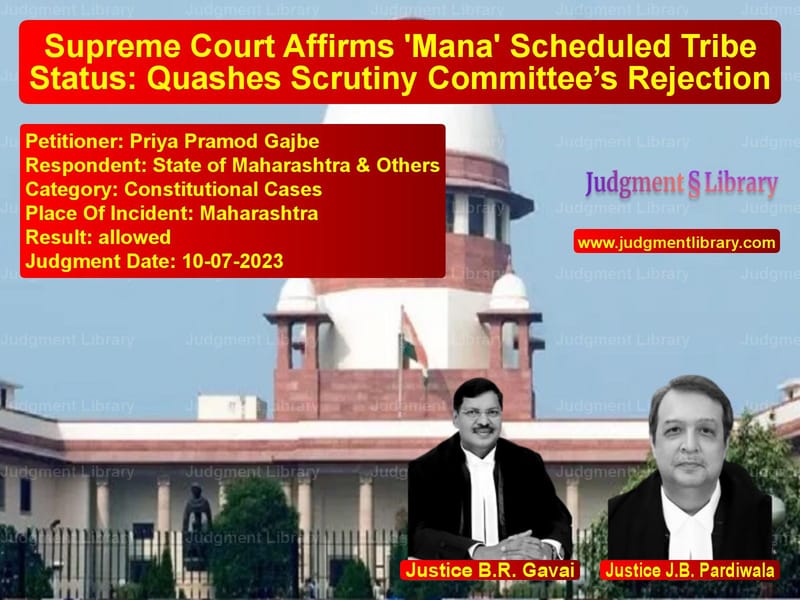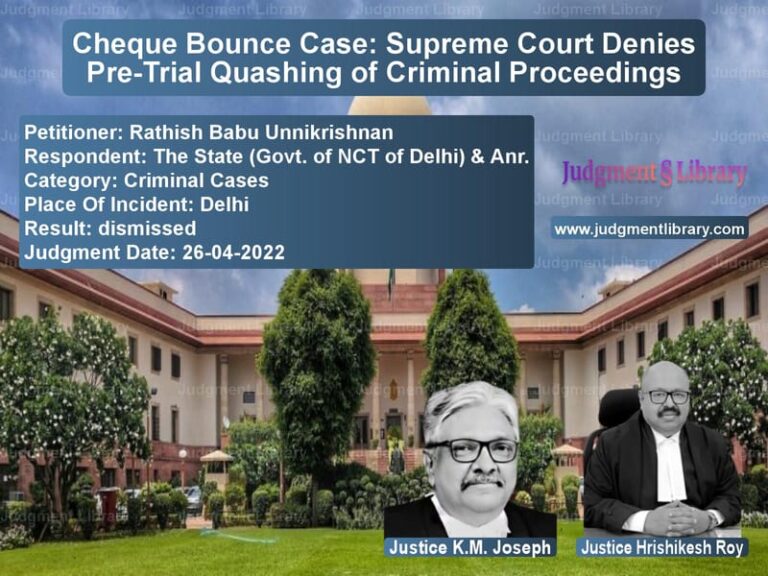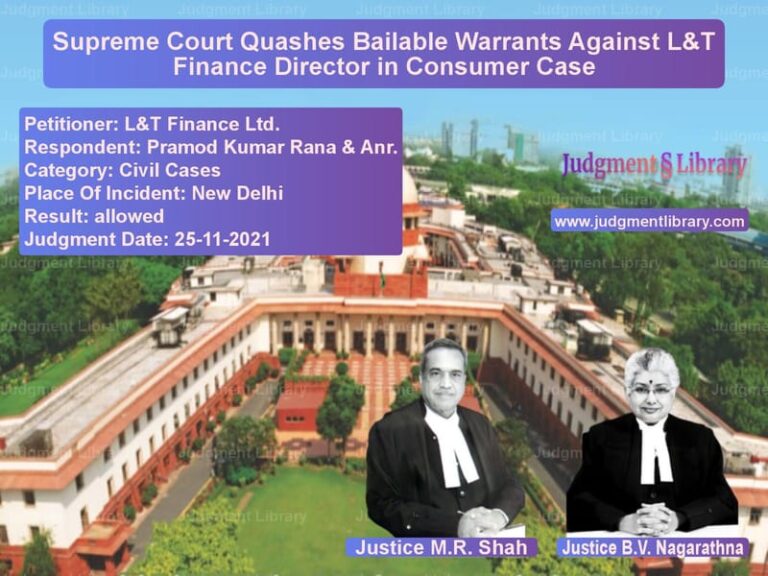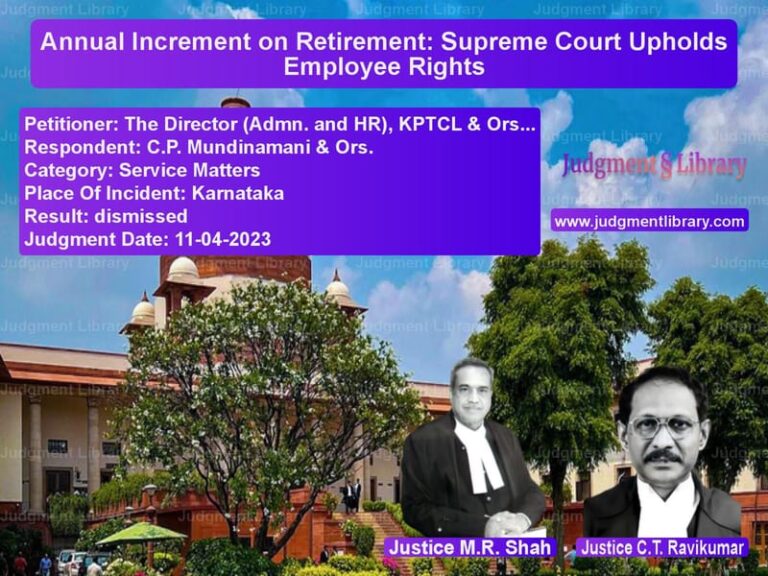Supreme Court Affirms ‘Mana’ Scheduled Tribe Status: Quashes Scrutiny Committee’s Rejection
The case of Priya Pramod Gajbe v. The State of Maharashtra & Others revolves around the rejection of a Scheduled Tribe (ST) claim by the Caste Certificate Scrutiny Committee, which was later upheld by the Bombay High Court. The Supreme Court, in a landmark judgment, reversed these decisions, reaffirming that pre-constitutional documents hold the highest probative value in caste verification and that the Affinity Test cannot be the sole determining factor.
Background of the Case
The appellant, Priya Pramod Gajbe, secured admission in the MBBS course at a medical college in Maharashtra in the academic year 2016-17 under the reserved category for Scheduled Tribes. She claimed to belong to the ‘Mana’ Scheduled Tribe. However, her caste certificate was referred to the Scheduled Tribe Caste Certificate Scrutiny Committee, Kokan Division, Thane, for verification.
Reasons for Rejection by the Scrutiny Committee
On December 12, 2017, the Scrutiny Committee invalidated her Scheduled Tribe claim on two primary grounds:
- Failure to Satisfy the Affinity Test: The committee conducted a vigilance inquiry and found that the appellant lacked traditional traits and customs associated with the ‘Mana’ tribe.
- Failure to Prove Original Residence in Mana-Tribe Areas: The committee asserted that the appellant could not demonstrate that her family historically resided in areas where ‘Mana’ Scheduled Tribe members were concentrated.
High Court Ruling
Aggrieved by the Scrutiny Committee’s decision, the appellant moved the Bombay High Court. However, on December 22, 2018, a Division Bench of the High Court upheld the rejection of her caste claim. The appellant then approached the Supreme Court.
Key Arguments Presented
Arguments by the Appellant
Senior Counsel Sudhanshu Choudhari appeared for the appellant and contended:
- Pre-Constitutional Documents Should Prevail: The appellant possessed a 1924 birth record of her great-grandfather indicating ‘Mana’ caste. This document should have been given the highest probative value, as mandated by past Supreme Court rulings.
- Improper Use of the Affinity Test: The test should be used only as corroborative evidence and not as a litmus test to reject a caste claim.
- No ‘Mani’ Caste Exists: While one document recorded her forefather’s caste as ‘Mani,’ this was likely a clerical error, as no such caste exists.
Arguments by the Respondents
The State of Maharashtra, represented by Counsel Shrirang B. Varma, argued:
- Conflicting Documents Raise Doubt: Some documents mentioned ‘Mani’ instead of ‘Mana,’ casting doubt on the appellant’s claim.
- Area Restriction Still Relevant: Even though area restrictions for Scheduled Tribes were removed in 1976, it remained necessary for a candidate to prove their family’s historical ties to an ST-designated region.
Supreme Court’s Analysis and Judgment
A bench comprising Justices B.R. Gavai and J.B. Pardiwala examined the legal principles governing caste verification and ruled in favor of the appellant.
Key Observations of the Court
1. Pre-Constitutional Documents Hold Supreme Authority
“Documents of the pre-Constitution period showing the caste of the applicant and their ancestors have got the highest probative value.”
The Court ruled that the appellant’s 1924 birth record confirming ‘Mana’ caste was sufficient proof of her tribal identity, as it predated caste-based reservations.
2. Affinity Test is Not a Litmus Test
“The Affinity Test may be used to corroborate documentary evidence but should not be the sole criteria to reject a claim.”
The Court recognized that migration, modernization, and cultural shifts could lead to a dilution of tribal customs, making it unfair to reject a claim solely on an Affinity Test.
3. Removal of Area Restriction in 1976
The Supreme Court held that the High Court erred in insisting that the appellant prove historical residence in tribal-designated areas. Since area restrictions were removed in 1976, no candidate should be required to establish such lineage.
Final Ruling
The Supreme Court quashed the Scrutiny Committee’s order and the Bombay High Court’s judgment, declaring that:
“The appellant belongs to ‘Mana’ Scheduled Tribe.”
The Court directed the Scrutiny Committee to issue a validity certificate within one month.
Impact of the Judgment
The ruling sets a crucial precedent for caste verification processes:
- Pre-Constitutional Documents to Take Precedence: This judgment ensures that caste verification committees cannot arbitrarily disregard historical records.
- Limited Role of the Affinity Test: The ruling curtails the over-reliance on Affinity Tests, which can unfairly disqualify genuine ST candidates.
- Clarification on Area Restrictions: The Court reaffirmed that candidates need not prove historical residence in ST-designated areas.
- Faster Resolution of Caste Disputes: The ruling may expedite caste verification by reducing unnecessary inquiries and rejections.
Conclusion
The Supreme Court’s decision in Priya Pramod Gajbe v. State of Maharashtra upholds the principles of fairness and justice in caste verification. By prioritizing pre-Constitutional documents and limiting the Affinity Test, the Court has ensured that deserving candidates are not unjustly denied their rightful Scheduled Tribe status.
Petitioner Name: Priya Pramod Gajbe.Respondent Name: State of Maharashtra & Others.Judgment By: Justice B.R. Gavai, Justice J.B. Pardiwala.Place Of Incident: Maharashtra.Judgment Date: 10-07-2023.
Don’t miss out on the full details! Download the complete judgment in PDF format below and gain valuable insights instantly!
Download Judgment: priya-pramod-gajbe-vs-state-of-maharashtra-supreme-court-of-india-judgment-dated-10-07-2023.pdf
Directly Download Judgment: Directly download this Judgment
See all petitions in Fundamental Rights
See all petitions in Public Interest Litigation
See all petitions in Separation of Powers
See all petitions in Judgment by B R Gavai
See all petitions in Judgment by J.B. Pardiwala
See all petitions in allowed
See all petitions in supreme court of India judgments July 2023
See all petitions in 2023 judgments
See all posts in Constitutional Cases Category
See all allowed petitions in Constitutional Cases Category
See all Dismissed petitions in Constitutional Cases Category
See all partially allowed petitions in Constitutional Cases Category







